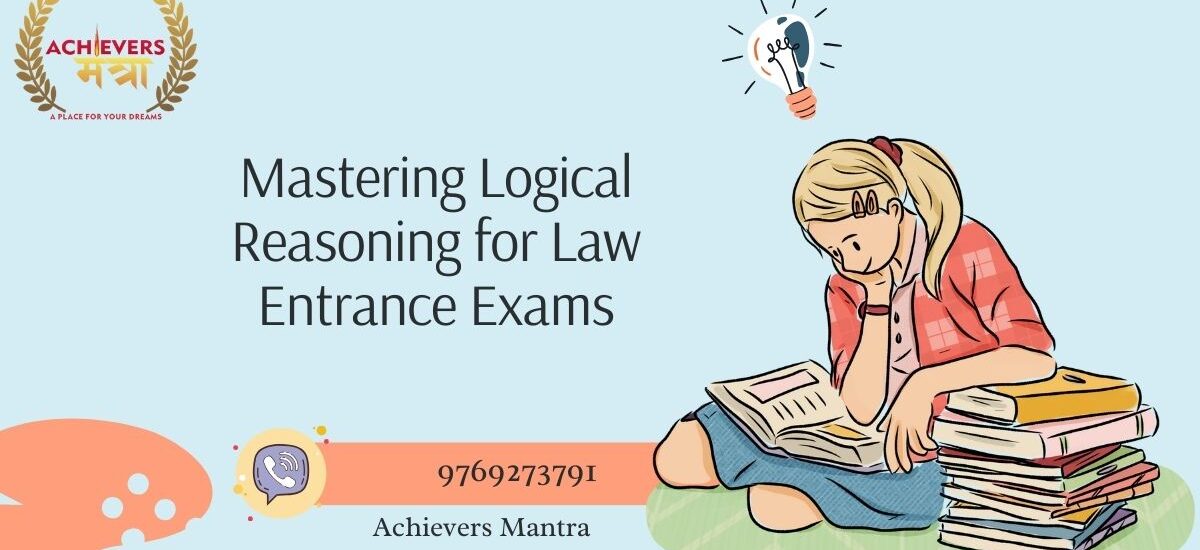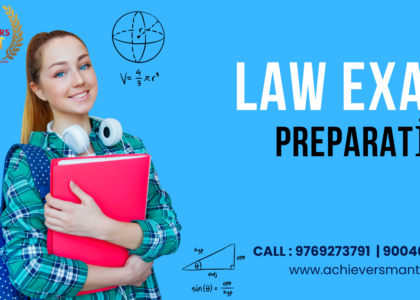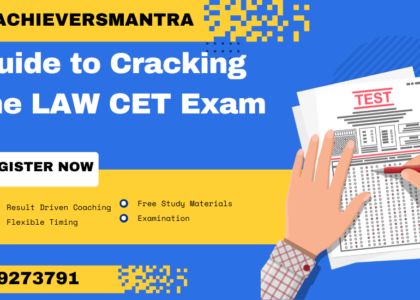Mastering Logical Reasoning for Law Entrance Exams- Mastering Logical Reasoning for Law Entrance Exams is not just a skill—it’s a crucial asset that can propel aspiring law students towards success. In the competitive landscape of law entrance exams, the ability to analyze arguments, evaluate evidence, and draw logical conclusions plays a pivotal role. In this enlightening blog post, we delve into the intricacies of logical reasoning, offering valuable insights and strategies to help aspiring law students navigate this essential aspect of their exam preparation journey. Join us as we explore the key concepts, effective techniques, and proven strategies for mastering logical reasoning, all tailored to the unique requirements of law entrance exams. Let’s embark on this journey towards logical reasoning excellence together.
Also Check: How to Choose the Right Competitive Exam for Your Career
Understanding Logical Reasoning
Logical reasoning forms the cornerstone of law entrance exams, serving as a fundamental skill that aspiring law students must hone to succeed. In this section, we delve into the essence of logical reasoning and its relevance to legal studies:
- Definition and Significance:
- Define logical reasoning within the context of law entrance exams, emphasizing its importance in assessing candidates’ analytical abilities and critical thinking skills.
- Highlight how logical reasoning skills are essential for interpreting legal texts, identifying logical flaws in arguments, and constructing sound legal arguments.
- Types of Logical Reasoning Questions:
- Explore the various types of logical reasoning questions commonly encountered in law entrance exams, including deductive reasoning, analytical reasoning, and logical puzzles.
- Provide examples and explanations for each question type to enhance understanding and familiarity.
- Application in Legal Studies:
- Discuss the practical application of logical reasoning skills in the field of law, illustrating how these skills are integral to legal analysis, case briefing, and legal argumentation.
- Emphasize the role of logical reasoning in evaluating legal precedents, interpreting statutes, and crafting persuasive legal arguments.
By gaining a comprehensive understanding of logical reasoning and its applications in legal studies, aspiring law students can lay a solid foundation for their exam preparation journey. Let’s delve deeper into the key concepts and techniques essential for mastering logical reasoning for law entrance exams.
Key Concepts and Techniques for Logical Reasoning Mastery
Unlocking the secrets to mastering logical reasoning requires a solid grasp of key concepts and effective techniques tailored to the nuances of law entrance exams. In this section, we explore essential concepts and techniques to enhance your logical reasoning prowess:
- Deductive Reasoning:
- Define deductive reasoning and its role in legal analysis, emphasizing the importance of drawing valid conclusions from given premises.
- Provide examples of deductive reasoning exercises commonly encountered in law entrance exams, such as syllogisms and conditional reasoning.
- Analytical Reasoning:
- Explore analytical reasoning, also known as logic games or puzzles, and its relevance to law entrance exams.
- Discuss strategies for effectively approaching analytical reasoning questions, including diagramming, identifying constraints, and making logical inferences.
- Critical Thinking Skills:
- Highlight the significance of critical thinking skills in logical reasoning, including the ability to evaluate arguments, identify assumptions, and detect logical fallacies.
- Offer exercises and practice scenarios to develop and sharpen critical thinking abilities in the context of legal reasoning.
- Logical Problem-Solving Techniques:
- Introduce practical problem-solving techniques tailored to the logical reasoning sections of law entrance exams.
- Cover strategies for breaking down complex problems, organizing information, and systematically approaching logical reasoning questions to maximize efficiency and accuracy.
By mastering these key concepts and techniques, aspiring law students can enhance their ability to tackle logical reasoning questions with confidence and precision. Let’s explore effective preparation strategies to further hone your logical reasoning skills for law entrance exams.
Also Check: Preparing for Competitive Exams: Strategies for Success
Effective Preparation Strategies for Logical Reasoning
Preparing for the logical reasoning sections of law entrance exams requires a strategic approach and consistent practice. In this section, we delve into effective preparation strategies to help aspiring law students excel in logical reasoning:
- Regular Practice Routine:
- Emphasize the importance of establishing a regular practice routine for logical reasoning questions.
- Encourage aspirants to dedicate specific time slots for practicing logical reasoning exercises, ensuring consistency and continuity in skill development.
- Utilization of Study Materials:
- Recommend a variety of study materials tailored to logical reasoning preparation, including prep books, online resources, and practice tests.
- Highlight the importance of utilizing a diverse range of materials to expose oneself to different question formats and difficulty levels.
- Focus on Weak Areas:
- Advise aspirants to identify and focus on their weak areas within logical reasoning, such as specific question types or critical thinking skills.
- Suggest targeted practice exercises and resources to address weak areas and strengthen overall proficiency in logical reasoning.
- Time Management Strategies:
- Stress the significance of effective time management during logical reasoning sections of law entrance exams.
- Provide tips and techniques for optimizing time allocation, pacing oneself during practice sessions, and strategically approaching time-bound questions.
- Review and Analysis:
- Encourage aspirants to review and analyze their performance on practice exercises regularly.
- Discuss the importance of identifying patterns, errors, and areas for improvement through self-assessment and reflection.
- Mock Tests and Simulations:
- Highlight the value of taking mock tests and simulations to simulate exam conditions and assess readiness.
- Recommend incorporating mock tests into the study routine to gauge progress, build endurance, and refine exam-taking strategies.
By incorporating these effective preparation strategies into their study routine, aspiring law students can enhance their confidence and performance in the logical reasoning sections of law entrance exams. Let’s explore common pitfalls and how to avoid them to further optimize exam readiness.
Common Pitfalls and How to Avoid Them
In the pursuit of mastering logical reasoning for law entrance exams, aspirants may encounter common pitfalls that can hinder their progress. In this section, we identify these pitfalls and offer strategies to overcome them:
- Misinterpretation of Questions:
- Headings:
- Misunderstanding the Problem Statement
- Description:
- Discuss the importance of carefully reading and understanding the problem statement in logical reasoning questions.
- Provide tips for identifying key information, clarifying ambiguities, and avoiding misinterpretation errors.
- Headings:
- Overthinking and Overcomplicating Solutions:
- Headings:
- Avoiding Overthinking
- Description:
- Highlight the tendency to overanalyze or overcomplicate solutions to logical reasoning questions.
- Offer strategies for maintaining clarity of thought, simplifying complex problems, and trusting one’s instincts when approaching questions.
- Headings:
- Jumping to Conclusions:
- Headings:
- Avoiding Hasty Conclusions
- Description:
- Discuss the risk of jumping to premature conclusions without fully evaluating all available information.
- Provide techniques for systematically evaluating evidence, considering alternative perspectives, and ensuring logical coherence in reasoning processes.
- Headings:
- Lack of Time Management:
- Headings:
- Managing Time Effectively
- Description:
- Address the challenge of managing time effectively during logical reasoning sections of law entrance exams.
- Offer time management strategies, such as prioritizing questions, setting time limits for each question, and practicing pacing techniques to maximize efficiency.
- Headings:
- Failure to Review and Learn from Mistakes:
- Headings:
- Learning from Mistakes
- Description:
- Emphasize the importance of reviewing and learning from mistakes made during practice sessions.
- Encourage aspirants to analyze errors, identify recurring patterns, and implement corrective measures to avoid making the same mistakes in future practice sessions.
- Headings:
By recognizing and actively addressing these common pitfalls, aspirants can enhance their proficiency in logical reasoning and improve their performance in law entrance exams. Let’s explore valuable resources and practice materials to further support logical reasoning mastery.
Also Check: Top Law Colleges in India: A Detailed Comparison
Resources and Practice Materials for Logical Reasoning Mastery
Accessing quality resources and practice materials is essential for honing logical reasoning skills and achieving success in law entrance exams. In this section, we highlight valuable resources and practice materials tailored to support aspirants in their journey towards logical reasoning mastery:
- Prep Books and Study Guides:
- Headings:
- Recommended Prep Books
- Description:
- Provide a curated list of recommended prep books and study guides focused on logical reasoning for law entrance exams.
- Highlight key features, such as comprehensive coverage of question types, detailed explanations, and practice exercises to reinforce learning.
- Headings:
- Online Courses and Video Lectures:
- Headings:
- Engaging Online Courses
- Description:
- Recommend engaging online courses and video lectures specifically designed to enhance logical reasoning skills.
- Highlight platforms offering interactive lessons, quizzes, and instructional videos to cater to diverse learning preferences.
- Headings:
- Practice Tests and Mock Exams:
- Headings:
- Full-Length Practice Tests
- Description:
- Encourage aspirants to utilize full-length practice tests and mock exams to simulate exam conditions and assess readiness.
- Provide links to reputable websites offering free and paid practice tests, along with recommendations for incorporating mock exams into the study routine.
- Headings:
- Interactive Problem-Solving Platforms:
- Headings:
- Interactive Problem-Solving Platforms
- Description:
- Introduce interactive problem-solving platforms and software tools designed to enhance logical reasoning skills through hands-on practice.
- Highlight features such as customizable question sets, real-time feedback, and performance tracking to facilitate skill development.
- Headings:
- Study Groups and Peer Discussions:
- Headings:
- Collaborative Study Groups
- Description:
- Highlight the benefits of joining study groups or engaging in peer discussions to enhance logical reasoning proficiency.
- Provide tips for forming study groups, organizing study sessions, and leveraging peer feedback to reinforce learning.
- Headings:
By leveraging these resources and practice materials, aspirants can cultivate a strong foundation in logical reasoning and maximize their chances of success in law entrance exams. Let’s conclude our exploration of mastering logical reasoning for law entrance exams with a summary of key insights and actionable takeaways.
Conclusion: Mastering Logical Reasoning for Law Entrance Exams
As we conclude our comprehensive exploration of mastering logical reasoning for law entrance exams, it’s evident that this critical skill plays a pivotal role in the success of aspiring law students. Let’s summarize the key insights and actionable takeaways from our discussion:
- Significance of Logical Reasoning:
- Emphasize the importance of logical reasoning skills in assessing candidates’ analytical abilities and critical thinking prowess, both essential attributes for success in legal studies and practice.
- Effective Preparation Strategies:
- Highlight the importance of establishing a regular practice routine, utilizing diverse resources, and focusing on weak areas to enhance logical reasoning proficiency.
- Common Pitfalls and How to Avoid Them:
- Address common pitfalls such as misinterpretation of questions, overthinking, jumping to conclusions, lack of time management, and failure to review mistakes, offering strategies to overcome them.
- Valuable Resources and Practice Materials:
- Provide recommendations for prep books, online courses, practice tests, interactive platforms, and study groups to support aspirants in their logical reasoning preparation.
By incorporating these insights and strategies into their study routine, aspiring law students can enhance their logical reasoning skills and maximize their performance in law entrance exams. Remember, mastering logical reasoning is not just about achieving high scores—it’s about developing critical thinking abilities that are essential for success in the legal profession.
As you embark on your journey towards logical reasoning mastery, stay focused, stay motivated, and believe in your ability to conquer the challenges that lie ahead. With dedication, perseverance, and the right resources at your disposal, you’re well on your way to achieving your academic goals and fulfilling your aspirations in the field of law.
Thank you for joining us on this enlightening journey through mastering logical reasoning for law entrance exams. We wish you all the best in your exam preparation endeavors. Here’s to your success!





